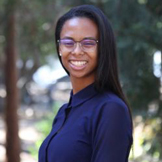 A MESSAGE FROM DR. LISA ESHUN-WILSON
A MESSAGE FROM DR. LISA ESHUN-WILSON
In 2018, I launched iMCB with the mission to enhance every student’s sense of belonging. I believed that if we as an institution implemented evidence-based, sustainable strategies to improve diversity, equity and inclusion efforts on campus, we could transform the institutional culture and alleviate the diversity tax on our marginalized students. It was an ambitious goal, but as a hub for social justice and innovation, Berkeley was the perfect place to cultivate a sense of belonging for historically underrepresented students, specifically those susceptible to institutional bias.
As a Czech-Ghanaian born in the small, beautiful town of Bergen, Norway and raised in the concrete jungles of South Central Los Angeles, I was pushed to think in unconventional, non-traditional ways from a young age. I grappled with interracial racism, sexism, classism across family ties and constantly found myself actively crafting new ways to unite polarizing groups to protect my loved ones. My background inspired my love of interdisciplinary research in addition to global policy studies. At Grinnell College, I majored in biochemistry with a concentration in policy studies, leading to engaging research projects ranging from the studying the effects of neocentromere formation on DNA localization in yeast with Dr. Laura Burrack to alleviating child food insecurity in partnership with the Department of Education in Des Moines, Iowa to exploring how social entrepreneurship can transform impoverished communities in collaboration with the Ministry of Health, Estelí Office in Nicaragua. Through these diverse academic experiences, I learned how to institutionalize new initiatives, implement change within fixed power structures and celebrate social entrepreneurship as a tool to inspire agency and self-governance across all fields.
I remember the crystallization of iMCB like it was yesterday. It was a warm, beautiful day in gorgeous Point Reyes, California. I was at the annual UC Berkeley Biophysics Graduate Group Retreat at the Marconi Center. It was an intimate, immersive experience filled with mouthwatering oysters, exciting scientific talks and fun social events. I still vividly remember being approached by Professor Susan Marqusee, one of my heroines, during our lunch break to talk about my science, graduate seminars, and local diversity and inclusion efforts! I explained that I wanted to create a space to discuss issues that disproportionately affected students like me, including imposter syndrome, stereotype threat and institutional racism. I wanted students to feel safe advocating for what they needed so they could be their best, most authentic and productive selves. After the conference, I also met with Professor Mike Eisen who actually helped me come up with the name iMCB!
After developing the curriculum for the iMCB conference, inspired by conversations with Professors Claude Steel of Stanford University and Rudolfo Mendoza-Denton, a leader in the Psychology Department here at UC Berkeley. I worked with Dr. David Weisblat, Chair of the Equity Committee & MCB Equity Advisor to submit a grant to support our efforts, which was immediately funded by our department chairs, Drs. David Drubin and Don Rio. Next, I worked closely with the fantastic Audrey Knowlton, Biological Sciences Graduate Diversity Director, and Dean Michael Botchan to institutionalize and scale the program. Moreover, I worked with the brilliant MCB staff to create a webpage for iMCB on our department’s website, launch a crowdfunding campaign to fund our program evaluation efforts, and annually host our conference with Communications Directory Ann Trapaga, IB Graduate Student Advisor Monica Albe, Director of Student Services Carina Galicia and MCB Graduate Student Advisor Hannah Bloom, respectively.
To increase faculty participation in our mentoring program, Professor Eva Nogales advocated for me to speak at all faculty meetings, which was an incredible opportunity to share my vision with the larger MCB community. I am extremely grateful to Professors Mike Eisen, Marla Feller, Diana Bautista, Iswar Hariharan, Susan Marqusee, and Matt Welch for serving as our first faculty mentors. After our first year, the conference was adopted as an official event in the New Graduate Student Orientation Week, Carina and Hannah committed to running our major operations, and we began collaborating closely with the Biophysics and Computational Biology Graduate Group, IB, and HWNI.
Today, we have grown into a community that impacts over 300 committed faculty, staff, postdocs and graduate students. We also added a research group, assessment team, board of directors, and much more – efforts spear-headed by our current directors Michelle Reid and Kyle Tucker. And I couldn’t be more proud!
iMCB would not be possible without my devoted mentor Eva Nogales. She supported me as I juggled publishing papers, securing grants, presenting at international conferences, and institutionalizing iMCB! This type of unwavering and loving support is extremely rare in academia and I, and iMCB, would not be where I am without her. Through this experience, I have learned that it truly takes a village to create everlasting and sustainable change.